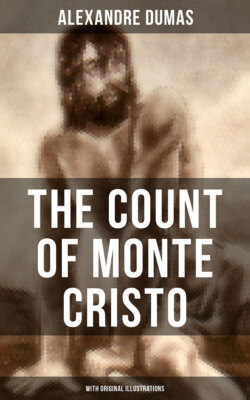Читать книгу The Count of Monte Cristo (With Original Illustrations) - Alexandre Dumas - Страница 109
На сайте Литреса книга снята с продажи.
Original
ОглавлениеLike other dwellers in the south, he was a man of sober habits and moderate desires, but fond of external show, vain, and addicted to display. During the days of his prosperity, not a festivity took place without himself and wife being among the spectators. He dressed in the picturesque costume worn upon grand occasions by the inhabitants of the south of France, bearing equal resemblance to the style adopted both by the Catalans and Andalusians; while La Carconte displayed the charming fashion prevalent among the women of Arles, a mode of attire borrowed equally from Greece and Arabia. But, by degrees, watch-chains, necklaces, parti-colored scarfs, embroidered bodices, velvet vests, elegantly worked stockings, striped gaiters, and silver buckles for the shoes, all disappeared; and Gaspard Caderousse, unable to appear abroad in his pristine splendor, had given up any further participation in the pomps and vanities, both for himself and wife, although a bitter feeling of envious discontent filled his mind as the sound of mirth and merry music from the joyous revellers reached even the miserable hostelry to which he still clung, more for the shelter than the profit it afforded.
Caderousse, then, was, as usual, at his place of observation before the door, his eyes glancing listlessly from a piece of closely shaven grass—on which some fowls were industriously, though fruitlessly, endeavoring to turn up some grain or insect suited to their palate—to the deserted road, which led away to the north and south, when he was aroused by the shrill voice of his wife, and grumbling to himself as he went, he mounted to her chamber, first taking care, however, to set the entrance door wide open, as an invitation to any chance traveller who might be passing.
At the moment Caderousse quitted his sentry-like watch before the door, the road on which he so eagerly strained his sight was void and lonely as a desert at mid-day. There it lay stretching out into one interminable line of dust and sand, with its sides bordered by tall, meagre trees, altogether presenting so uninviting an appearance, that no one in his senses could have imagined that any traveller, at liberty to regulate his hours for journeying, would choose to expose himself in such a formidable Sahara. Nevertheless, had Caderousse but retained his post a few minutes longer, he might have caught a dim outline of something approaching from the direction of Bellegarde; as the moving object drew nearer, he would easily have perceived that it consisted of a man and horse, between whom the kindest and most amiable understanding appeared to exist. The horse was of Hungarian breed, and ambled along at an easy pace. His rider was a priest, dressed in black, and wearing a three-cornered hat; and, spite of the ardent rays of a noonday sun, the pair came on with a fair degree of rapidity.
Having arrived before the Pont du Gard, the horse stopped, but whether for his own pleasure or that of his rider would have been difficult to say. However that might have been, the priest, dismounting, led his steed by the bridle in search of some place to which he could secure him. Availing himself of a handle that projected from a half-fallen door, he tied the animal safely and having drawn a red cotton handkerchief, from his pocket, wiped away the perspiration that streamed from his brow, then, advancing to the door, struck thrice with the end of his iron-shod stick. At this unusual sound, a huge black dog came rushing to meet the daring assailant of his ordinarily tranquil abode, snarling and displaying his sharp white teeth with a determined hostility that abundantly proved how little he was accustomed to society. At that moment a heavy footstep was heard descending the wooden staircase that led from the upper floor, and, with many bows and courteous smiles, mine host of the Pont du Gard besought his guest to enter.
